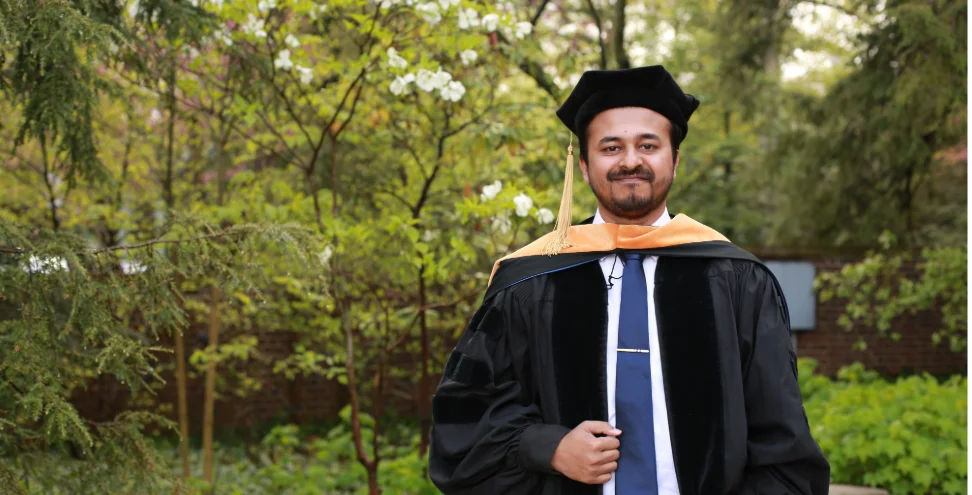Admission Essay for Student Visa: A Comprehensive Guide to Studying Abroad
Sulekha Study Abroad: From Expert Guidance to Global Opportunities.
- Comprehensive Guidance: Expert advice on universities, courses, and scholarships.
- Top Destinations: Insights into renowned study-abroad countries.
- Up-to-date data: Information on foreign entrance exams, deadlines & accreditation.
- Personal Growth: Cultural immersion, independence, and global perspective.
- Enhanced Support: NEHA Chatbot for instant answers and guidance.
- Expert Consultation: Personalized advice from verified professionals.
The dream to study abroad is one shared by many. It's an opportunity to learn in the best in the world, become internationally oriented, and advance both personally and professionally. Nevertheless, it comes with a few steps, and one of the most important yet underestimated parts of the process is the admission essay.
Whether you're seeking admission to a foreign university or a student visa, your admission essay (or Statement of Purpose) is crucial in conveying your intentions, qualifications, and ambitions. This guide will assist you in knowing what an admission essay is, its importance in the visa process, categories of student visas, and all else you need to know to prepare for studying abroad.
Table of Contents
- What is an Admission Essay?
- Why Is an Admission Essay Important for a Student Visa?
- Types of Student Visas
- Student Visa Application Process
- Essential Requirements for Student Visas
- Key Elements of a Strong Admission Essay
- Tips for Writing an Impressive Admission Essay
- Common Mistakes to Avoid in Admission Essays
- Other Important Things to Know Before Studying Abroad
- FAQs
What is an Admission Essay?
An admission essay, also known as a Statement of Purpose (SOP) or Personal Statement, is a written account submitted with your application to a foreign educational institution. In contrast to transcripts or test scores, which are quantitative only, the admission essay provides an opportunity for you to demonstrate your personality, motivations, values, and long-term aspirations.
- For why you're opting for a specific course and university.
- How your background will enable you to make that choice.
- What you expect to do once you have finished the program.
A well-written essay sets you apart from other applicants and shows you are prepared for academic achievement and cultural adjustment.
Why Is an Admission Essay Relevant to a Student Visa?
Most students believe the admission essay is done after submitting an application to the university. But it also indirectly yet critically contributes to your visa approval process.
1. Indicates Academic Intent: Visa officers are keen to ensure that your education is the primary reason for your travel. A solid SOP demonstrates your genuine academic interest.
2. Supports Visa Interview Answers: In case your essay is consistent with your verbal answers during the visa interview, it lends credibility and trustworthiness to your profile.
3. Proof of Purpose: Several nations demand a statement of purpose to confirm your academic objectives and how the course relates to your long-term career plans.
4. Evidence of Return Intent: Officers must be assured that you will go back to your home country upon completion of your studies. Your essay must have clear future plans and how they relate to your home country's future.
Types of Student Visas
Every nation has various types of student visas based on the length, level of study, and type of course.
1. F-1 Visa – United States: Issued to full-time students studying at institutions of learning. Students are required to be full-time and are permitted to work part-time on campus.
2. Tier 4 Visa – United Kingdom: The UK general student visa for persons aged 16 years or above. It is subject to sponsorship by a registered education provider and demonstration of funds and English language abilities.
3. Subclass 500 – Australia: This visa permits international students to study a full-time CRICOS-registered course. It permits restricted part-time work and access to family-dependent visas.
4. Study Permit – Canada: Rather than a visa, this is a legal document that permits foreign nationals to study at Designated Learning Institutions (DLIs) in Canada. Work opportunities on and after study are also available.
5. Schengen Visa – Europe: Short-term student visas for study courses less than 90 days. For longer courses, you will have to apply for a long-stay student visa in the relevant European country.
Student Visa Application Process
The process of applying for a visa differs from country to country but generally follows this pattern:
Step 1: Obtain University Admission: You need to obtain an offer letter or confirmation of admission from a recognized institution before applying for a student visa.
Step 2: Gather Required Documents
- Valid passport
- Financial documentation
- Admission letter
- SOP/admission essay
- Passport-size photographs
- Language proficiency exam scores
Step 3: Submit the Visa Application: Complete the online/offline application form and pay for the visa fee. Verify accurately before submission.
Step 4: Biometric & Medical Tests: A few nations (i.e., Canada, UK, Australia) seek biometric details and medical examinations.
Step 5: Visa Interview: Needful for America and some other nations. They will ask about your course of study, college, finances, and future courses of action.
Step 6: Await Approval: Processing time for visas ranges from a few weeks to a few weeks. Upon approval, you can start making travel arrangements.
Basic Requirements for Student Visas
Though individual documents differ, all countries demand the following:
|
Document |
Purpose |
|
Valid Passport |
Must be valid for the entire duration of the study period |
|
Letter of Acceptance (LoA) |
Proof of enrollment from an accredited university |
|
Statement of Purpose (SOP) |
Justifies your academic goals, university choice, and future plans |
|
Academic Transcripts |
Evidence of your past education and qualifications |
|
Proof of Financial Support |
Demonstrates ability to pay tuition + living costs |
|
English Proficiency Test Scores |
Required by most institutions (e.g., IELTS, TOEFL, PTE) |
|
Passport-size Photos |
Usually 2–4 photos as per visa specifications |
|
Medical Certificate/Insurance |
Some countries require health check-ups and insurance (e.g., OSHC in Australia) |
Always look at the official website of the destination country's immigration authority for the latest list.
Key Elements of a Strong Admission Essay
In order to write a commendable admission essay, incorporate these key elements:
1. Introduction: Begin with a hook that grabs the reader's attention. State your academic interests and the reason why you want to study the course.
2. Academic Background: Emphasize your academic experience and achievements. Relate them to the selected course.
3. Reason for Course Selection: Explain why you've selected the program. Describe the curriculum, specializations, and skills you anticipate to acquire.
4. Career Goals: Describe short-term and long-term objectives. How will the course assist you in accomplishing them?
5. Why This University? : Research and include distinctive features of the institution—faculty, research, campus culture, or rankings.
6. Adaptability and Cultural Awareness: Demonstrate how ready you are to adjust to a new environment and engage with various cultures.
7. Conclusion: Summarize your motivation and reaffirm your enthusiasm and dedication to the program.
Writing Tips for an Effective Admission Essay
- Begin Early: Allow yourself time for research and several revisions.
- Make Each Essay Personalized: Customize your SOP for every university.
- Write with Clear, Formal Language: Avoid slang, jargon, or very technical words.
- Make It Personal but Professional: Find a balance between telling stories and academic content.
- Be Original: Always use your own words and ideas.
- Obey Instructions: Word limit, font size, and structure are important.
- Ruthless Edit: Check grammar, clarity, and tone. Get feedback from others.
Mistakes to Avoid Making in Admission Essays
|
Mistake |
Why It’s Problematic |
|
Using Generic Statements |
Fails to show why you are uniquely suited for the course/university |
|
Repeating Resume Content |
Adds no new value or personal perspective |
|
Lack of Structure |
Makes it difficult to follow your ideas or story |
|
Overusing Jargon or Complex Words |
May seem pretentious and reduce clarity |
|
Not Mentioning Career Goals |
Visa officers look for intent and return plans |
|
Ignoring Guidelines (Length/Format) |
Shows carelessness; may lead to rejection |
|
Plagiarized Content |
Can lead to disqualification or blacklisting from universities |
Other Vital Things to Note before Studying Abroad
1. Language Proficiency: Make sure you qualify for the English language requirements. Most countries have alternative English proficiency tests such as Duolingo or PTE.
2. Living Expenses & Tuition: Make a thorough budget. Look out for unseen expenses such as lab fees or housing deposits.
3. Health Insurance: Numerous nations demand medical insurance for international students. Learn about what you can cover.
4. Part-Time Work Rules: Know how many hours you’re allowed to work. In many countries, students can work 20 hours/week during term time.
5. Scholarship Opportunities: Look for merit-based or need-based scholarships offered by governments, institutions, or private bodies.
6. Post-Study Work Visa: Understand the regulations around staying back to work after graduation.
7. Accommodation: Research on-campus vs. off-campus housing. Consider safety, cost, and proximity to your institution.
FAQs on Admission Essay for Student Visa
1. Is an admission essay compulsory for student visas?
Although not always required for the visa, it is most important for university admission, which determines visa approval.
2. How many words should I write in my admission essay?
500 to 1000, depending on what guidelines the university provides.
3. Am I allowed to use AI software to write my admission essay?
AI software can assist you in brainstorming, but the writing must be original, genuine, and from your own perspective.
4. What's the difference between an SOP and a personal statement?
They are sometimes interchangeable, but SOPs concentrate more on academic and professional ambitions, whereas personal statements can contain more life story.
5. Can I use the same essay for multiple universities?
It's advisable to tailor your essay to each university to demonstrate real interest.
6. Do visa officers read SOPs?
They might not read it thoroughly but take it into account for recognizing your intent and course direction.
7. Suppose my visa is denied even though I have a good SOP?
Visa decision is based on various aspects like finances, intent, and documentation—not your essay alone.
8. When can I begin to write my admission essay?
Minimum 2–3 months in advance of the application deadline for revisions.
9. Who should check my admission essay?
Academic advisers, instructors, guides, or experienced editors well versed with international education.
Your admission essay is your voice throughout the application process—use it wisely. For university acceptance, for a letter of recommendation in support of your student visa, or otherwise, writing a considered and strong essay boosts your odds of success and brings your dream of study abroad one step nearer.
Recently Added Study Abroad Blogs
- London-Business-School-Rankings-Courses-Admission-Fees-Scholarships-Placements
- University-Of-Western-Australia-Uwa-Ranking-Courses-Admission-Fees-Scholarship-Placement
- Automotive-At-Massachesetts-Institute-Of-Technology-Mit-Usa
- Facc-Foundations-Serge-Bellanger-International-Business-Degree-Scholarships-In-Us-And-France-Usa
- Medicine-At-Swinburne-University-Of-Technology-Australia
- Medicine-At-King-S-College-London-Uk
- Law-At-Queen-Mary-University-Of-London-Uk
- Colorado-State-University-Fort-Collins-Rankings-Courses-Admission-Fees-Scholarships-And-Placements
-
NehaAnswered on 09/04/2024
To study MBA in the USA, you need to follow these steps: 1. Research and select the universities you want to apply to based on your preferences and eligibility. 2. Take the required exams such as GMAT or GRE, and TOEFL or IELTS if you are an international student. 3. Prepare a strong application package including transcripts, essays, letters of recommendation, and resume. 4. Apply to the universities of your choice following their application deadlines and instructions. 5. Upon acceptance, apply for a student visa and make necessary travel arrangements. Please note that the specific requirements and procedures may vary by university, so it is important to carefully review the information provided by each institution.
(5)(3)Have questions about studying abroad? Ask NEHA, your study abroad companion!
Top Study Abroad Consultants
-
P
Services: Study Abroad,Foreign education entrance exam coaching
About:Established in 2018, Walk International provides a Read moreEstablished in 2018, Walk International provides a holistic approach to overseas education for students pursuing UG, PG, and Doctorate degrees. The coaching covers IELTS, TOEFL, GRE, and GMAT for the UK, USA, Canada, Australia, France, and other English-speaking countries. Walk International is also an authorized test registration center for British Council. Students can also get counseling and efficient processing of visas and documents for enrollment.
-
T
Services: Study Abroad,Foreign language training,Foreign education entrance exam coaching
-
T
Services: Study Abroad,Visa consultants,US Visa consultants
About:The Parashars, established in 1998, boasts over 25 Read moreThe Parashars, established in 1998, boasts over 25 years of experience in providing comprehensive immigration and educational consultancy services. We specialize in entrance exam training, visa success strategies, and complete immigration solutions. Operating primarily in New Delhi, The Parashars partners with over 10 countries and collaborates with more than 50 universities globally. Accredited by leading educational and immigration bodies, we maintain an exceptional visa success rate and have
Review: I totally recommend them. Once you handover your details to them you literally don’t have to worry, they will make sure that you get your slot before your intake.
-
C
Services: Study Abroad,Foreign education entrance exam coaching
About:Consigner Overseas Education Private Limited was e Read moreConsigner Overseas Education Private Limited was established in 2015 and has been a leading organization in the study abroad field. Priya Kohli and Ravi Gosain are the directors of this organization. They have a dedicated team of qualified immigration experts with expertise in the study permit and immigration procedures of the countries, i.e., USA, UK, Germany, Canada, Australia, and New Zealand.
Review: “The service was excellent and very professional. The team was polite, trustworthy, and ensured everything was handled smoothly. Highly satisfied with the overall experience
-
K
Services: Study Abroad
About:Keemaya Overseas Education Services is a leading e Read moreKeemaya Overseas Education Services is a leading educational consultancy that empowers students to explore global learning opportunities. With a vast network of 250+ universities spanning countries like Germany, Holland, Denmark, Poland, Hungary, Sweden, France, and more, they specialize in personalized guidance for aspiring students. Their mission is to match students' profiles with the right institutions and destinations, ensuring a seamless transition to international education. Their exp
Review: I got an instant call and set my meeting.
-
N
Services: Study Abroad
About:New Dawn Overseas Services is a top educational co Read moreNew Dawn Overseas Services is a top educational consultancy that specializes in guiding students towards higher education opportunities abroad. Committed to facilitating access to esteemed international institutions, they offer comprehensive services tailored to each student's needs. Their experienced consultants provide personalized assistance in university selection, course counseling, and application processes, ensuring a smooth journey toward academic success. Focusing on student well-be
Review: I am writing on the basis of my first interactions. It is good so far to get in touch with the agency. Feels helpful.
-
I
Services: Study Abroad
About:Infocus Overseas Education Consultants, headquarte Read moreInfocus Overseas Education Consultants, headquartered in New Delhi, India, is a leading overseas education consultancy. Their mission is to simplify the study abroad process for aspiring students. They offer free professional career counseling to Indian students aiming for higher education in countries like Canada, New Zealand, the USA, Australia, and the UK. With a wide array of programs, colleges, and universities, they guide students in choosing the right course and institute. They offer a wi
Review: ndjdjene shrines skndjdbebs d
-
S
Services: Study Abroad,Visa consultants,Foreign education entrance exam coaching
About:Bridging Immigrations is a reputable Canadian immi Read moreBridging Immigrations is a reputable Canadian immigration and settlement firm with established offices in Toronto /Ontario, Canada with a satellite office in New Delhi / India. Our firm specializes in assisting professionals and business individuals in successfully immigrating and settling in Canada, aiming to offer them a better future and enhanced quality of life. It is Led by Vinod Kumar and Pankaj Kapoor, both licensed experts recognized by the Immigration, Refugees and Citizenship Canada (I
-
I
Services: Study Abroad,Visa consultants,Educational Consultants
About:Innvictis Solutions LLP is a leading student visa Read moreInnvictis Solutions LLP is a leading student visa consultancy in North India. Their goal is to support every learner, every learning professional, education institute and recruitment organizations through our work. It has tried to dispel the myths associated with abroad studies and internships by simplifying the procedures through technology resourcing and knowledge consulting with institutions and agencies alike. To date, many students have successfully gone to different countries through our c
-
T
Services: Study Abroad,Visa consultants
About:THE SS INTERNATIONAL boasts eight years of dedicat Read moreTHE SS INTERNATIONAL boasts eight years of dedicated experience in facilitating immigration, study abroad, permanent residency, and visa procedures for various countries, including Canada, Australia, and Germany. With a team of ten experts, they offer personalized guidance tailored to each client's unique requirements and aspirations. Setting themselves apart, they prioritize client interests over commissions from educational institutions, ensuring unbiased advice for optimal decision-making
Review: ?? Many heartfelt blessings to THE SS INTERNATIONAL! ?? With your dedicated efforts and expert guidance, I successfully received my Singapore visa. I am truly grateful to the entire team for making my dream come true. May your company continue to grow and help many more people achieve their aspirations. Wishing you all endless success, prosperity, and countless visa approvals ahead. ???
-





.png)
.png)





